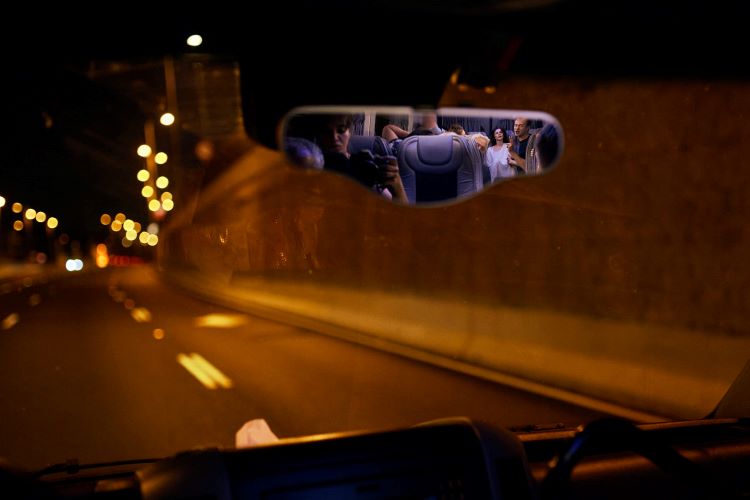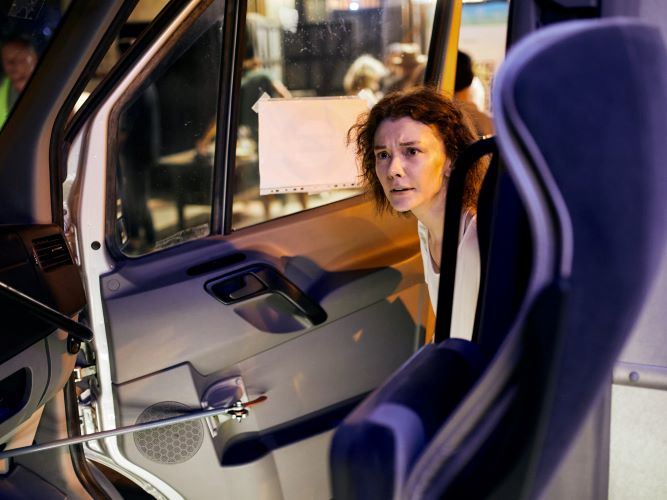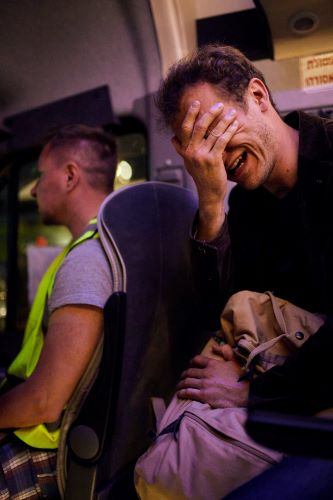
The Whole New World is a unique and thought-provoking work that held its world premiere at the Malenky Theatre’s Tel Aviv International Theatre Festival. As a real-time response to war and international crisis, the play is ambitious in its aims, yet it also pushes at its formal, theatrical boundaries. Directed by Konstantin Kamensky and written by Kamensky and Inna Cebotari, the play depicts an encounter between a refugee from the Ukraine and a refugee from Russia, who happen to be on the same bus, a replacement bus running between Tube stops in London. The entire play, about an hour in duration, takes place during an actual bus ride, with the audience in the role of fellow-passengers. Intimate and interactive, each performance is different, each performance is a risk, a high-wire act without a net.
Refugees live in uncertainty, they may have managed to reach a place of relative safety, yet it is not their home, it is not necessarily where they would like to be, and it is not even certain that they will be permitted to remain there. Situating the play on a bus ride puts the audience members a small step closer to imagining what life is like for a refugee, hurtling in the dark towards the unknown. In getting on the bus audience members relinquish a measure of their freedom, captive in a relatively small space with a group of strangers. The energy in the bus – and therefore in the play – is influenced by the cohort of people (it’s limited to 13) at any given performance. Some people will become very uncomfortable when they leave their comfort zone, some will be amused, some will be intrigued, some will be indifferent, and some will immerse themselves in the experience. All the different individual responses leave their mark on the performance, altering the emotional climate.

The actors – Eva Mashtaler and Ivan Ivashkin – deliver outstanding performances. Sitting among the audience, barely a breath away, all locked in together, riding through the night – it is the most demanding of roles. Both Mashtaler and Ivashkin embody their characters so fully, they make them present as individuals, swaying the emotions of the audience, eliciting empathy, and even anger and frustration at their choices. The play is scripted, yet the actors must also respond to whatever the audience members happen to say or do. As people are settling into their seats, a woman in a white dress gets on the bus, asking “Do you know the final destination?” For me, it was a poetic moment, as her words took me beyond the literal into metaphor, and the uncertainty of being a refugee, a stranger in a strange land. Although I already knew that the play is a two-hander, I did not immediately identify the second actor, and that was a fun surprise.

Public transportation is the place of chance encounters. It’s where a refugee from the Ukraine might meet someone from Russia, the enemy. What happens in that encounter is something I prefer not to disclose, leaving it open to others to experience the play fully. One might get on the bus with a certain set of beliefs, knowing where one’s empathy lies, and emerge at the end of the evening with a different awareness. What happens when we encounter the enemy face to face? Is it possible to see the person before you as a person? Is it possible to relate as one human to another, without the considerations of politics, nationality, ethnicity, religion, gender or other barriers? What part of our beliefs and feelings are based on partial knowledge, prejudice, or ignorance? Can we feel empathy for a stranger? Can we feel empathy for the person we believe to be our enemy? And if we do, would we be willing to help?
Every audience will have a different relationship to the characters depicted in the play and to the conflict. At the play’s world premiere at the Malenki Theatre, from what I could discern, the audience was primarily Israeli and Russian-speaking Israelis of Russian or Ukranian background. I wonder if our relationship to the characters and the war might be dramatically different from that of a British audience. As an Israeli, I have some sense of what it is like to live in a country that experiences war. I know what it feels like to have others tell you – by their words or gaze – “fix your country”, and I know as an individual how that task feels gargantuan, impossible. Perhaps people in England feel that way too these days.
As the play is set on public transport in London, I feel that there are some aspects of the play that will resonate more with people who live or have lived in England, or who have a familiarity with English culture. It’s a strong play regardless, yet for me, there were two instances where that sense of recognition, and the associations it raised, led me to experience the moment more deeply. While setting the play on a bus ride enhances certain aspects of the performance, it is not without its limitations. At a certain point, towards the end, there is an inevitable dissipation of tension and difficulty in sustaining the energy of the play. Yet overall, The Whole New World is an intense experience that confronts audiences with the fragility, complexity, ambiguity and resilience of our existence. It explores those moments where we must make a choice, those moments when our actions and choices have an impact on others. The Whole New World touches on the very essence of our humanity.
The Whole New World
Directed by Konstantin Kamensky; Written by Konstantin Kamensky and Inna Cebotari in collaboration with the creative team; Cast: Eva Mashtaler and Ivan Ivashkin





